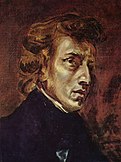Frédéric Chopin (1810–1849), was a Romantic-era composer born in what was then the Duchy of Warsaw of a Polish mother and a French father. A child prodigy, he grew up in Warsaw, where he completed his musical education and composed many of his works before leaving Poland less than a month before the outbreak of the November 1830 Uprising. At the age of 21 he settled in Paris, where he gained renown as a leading piano virtuoso of his generation despite giving only some 30 public performances during the remaining 18 years of his sickly life. Chopin was a good friend of the Hungarian composer Franz Liszt and maintained an often troubled relationship with the French writer George Sand. All of Chopin's compositions include the piano; most are for solo piano, although he also wrote two piano concertos, a few chamber pieces, and some songs to Polish lyrics. His keyboard style, which is highly individual, is often technically demanding; his own performances were noted for their nuance and sensitivity. Chopin invented the concept of instrumental ballade; his major piano works also include sonatas, mazurkas, waltzes, nocturnes, polonaises, études, impromptus, scherzos, and preludes. His innovations in style, musical form, and harmony, as well as association of his music, often blending Polish folk tunes and classical tradition, with nationalism, were influential throughout and after the late Romantic period. (Full article...)
